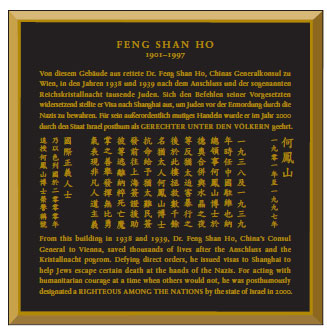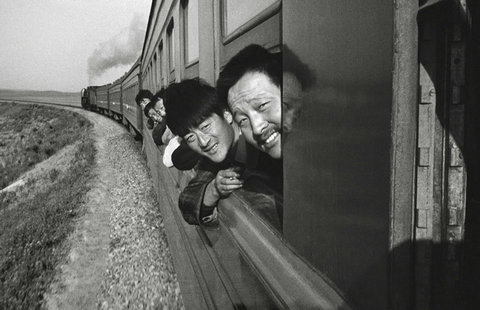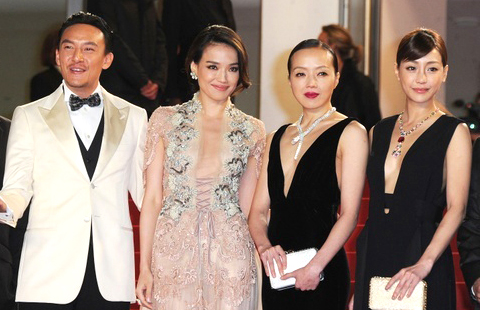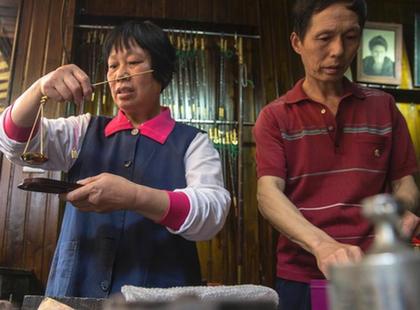Ho Feng Shan: A man of compassion, courage
Updated: 2015-04-24 11:18
By May Zhou(China Daily USA)
|
||||||||
 |
|
The commemorative bronze plaque unveiled in Vienna on April 21 at the site of the former Chinese Consulate General building. |
Other documents
The only surviving Chinese documentation that Ho Manli has found indicates that the Chinese Consulate in Vienna issued an average of 500 visas a month to Jews in the nearly two years after the Anschluss. There is also evidence that in addition to visas, Ho issued other documents to help Jews, she said.
"As to how many lives were saved, even my father himself never knew," Ho Manli said. "He was never reunited with any of those he had helped. Actually, the majority of them never knew his name."
Another question that Ho Manli is often asked is: Why would a man from China save Jews in Europe when others would not?
"My immediate answer is that if you knew my father, you would not need to ask," Ho Manli said. "What he did was totally in character. He was a man of conscience and courage with a compassionate heart."
Ho's own explanation for what he did was simply this: "On seeing the Jews so doomed, it was only natural to feel deep compassion, and from a humanitarian standpoint, to be impelled to help them."
Another reason that would have propelled her father to extend his hand to Jews, Ho Manli said, is that he came from a generation of Chinese who felt that China had been humiliated and persecuted by 100 years of foreign imperialism. In fighting Japanese aggression, this generation was determined not to allow that humiliation to continue. In that sense Ho Feng Shan was very sensitive to persecution and to bullying of any peoples, Ho Manli said.
'Greatest feat'
Born into poverty in rural China, Ho Feng Shan obtained his PhD from the University of Munich in 1932, where he witnessed the rise of Adolf Hitler. He joined the Chinese Foreign Service in 1935 and served for nearly 40 years before retiring to San Francisco. Ten years after his death in 1997, in accordance with his wishes, he was buried in his beloved hometown of Yiyang in China's Hunan province.
Ho Manli is writing a book on the history that she has uncovered. "I would say this is my greatest feat as a journalist," she said. "I had to learn the history and politics of both China and Europe during that era. And I feel a responsibility not just to my father, but to the survivors and to history to record it accurately."
"When I began this search nearly 18 years ago, I never imagined that it would keep unfolding as it has," she continued. "As I waded deeper into these unknown waters, the story became panoramic and grew to encompass the hitherto un-chronicled history of escape from genocide in Europe, and how a singular action led to the creation of a refuge on the other side of the world - in China."
"What my father did in those two short years in Vienna has to be placed in a much larger context, which is the interplay of Chinese and Western history in the 20th Century," Ho Manli said. "That is the task I have given myself as I attempt to gather all of this into a book."
Contact the writer at mayzhou@chinadailyusa.com
- Fourth generation of 'face-kini' soon to hit beach in Qingdao
- Tibetan town captures photos of their 'panda deity'
- 600 arrested in Beijing's vice crackdown
- Building collapse in Guizhou caused by landslide: govt
- Xi welcomes Japan delegation but warns against historical distortion
- Chinese Vice-Premier stresses flood control
- Ireland becomes first country to vote for equal marriage: PM
- Gov't declares high alert after landslide blocks Kali Gandaki River in Nepal
- Restorers give shape to Pompeii victims
- China, Russia end joint naval exercises
- Japanese visit underlines thaw in relations
- China, Brazil cooperation can ride 'winds and tides'

 Premier talks with Chinese entrepreneurs in Peru
Premier talks with Chinese entrepreneurs in Peru
 Tourists enjoy themselves at Mingsha Hill desert
Tourists enjoy themselves at Mingsha Hill desert
 Colombia: A birdwatcher's paradise
Colombia: A birdwatcher's paradise
 Journey of a migrant girl from village to ad world
Journey of a migrant girl from village to ad world
 Photographer captures Chinese on the train
Photographer captures Chinese on the train
 Hou Hsiao-Hsien's The Assassin premieres in Cannes
Hou Hsiao-Hsien's The Assassin premieres in Cannes
 Top 10 highest-paid white-collar jobs in China
Top 10 highest-paid white-collar jobs in China
 The dying craft of balance scales
The dying craft of balance scales
Most Viewed
Editor's Picks

|

|

|

|

|

|
Today's Top News
Chinese premier arrives in Chile for official visit
Expansion of free trade possible on Chile visit
Chilean president sees promising prospects for relations with China
Chinese premier encourages firms to upgrade cooperation with Peru
China, Peru agree on feasibility study on transoceanic railway
China manufactures first
car for US market
Wisconsin hopes to make cheeseheads in China
China, Peru to diversify trade focus
US Weekly

|

|






